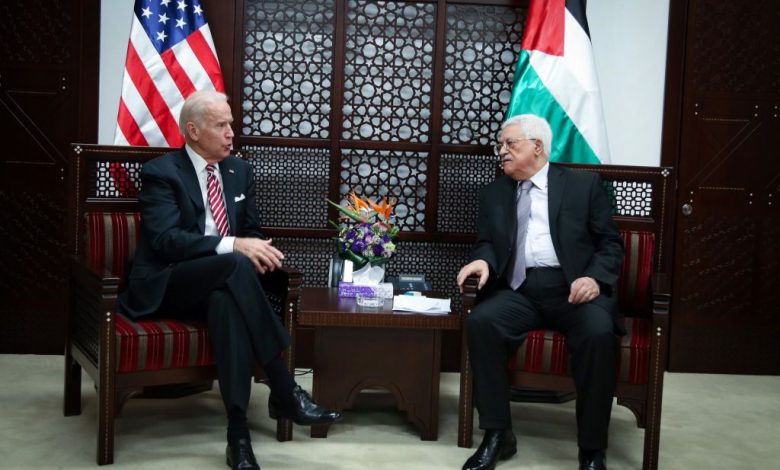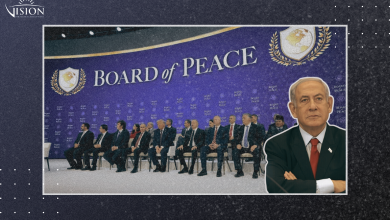Palestinian Cause and Biden’s Visit: Vision and Implications

Kareem Kart [1]
US President Joe Biden visited the Palestinian territories within his regional trip that started in “Israel” and ended up in Saudi Arabia on 13-16 July. His visit to Bethlehem was the shortest in his 4-days tour to the region where he spent a couple of hours during which he met with Palestinian President Mahmoud Abbas before heading to the Church of Nativity.
Biden’s regional visit came out amid dynamic geopolitical developments that made the US take a key U-turn on its foreign policy regarding the Middle East, the Kingdome of Saudi Arabia in particular. However, the Palestinian cause was marginalized at the visit’s agenda except for some financial and humanitarian aids, which questions whether such a marginalization represents a continuation of Trump’s policy or points to certain purposes that made the US realign its priorities in the Middle East.
US Strategy Change in the Region
Despite being busy with major issues such as confronting the Chinese rising and Russia’s return to the international area, the US is still keen on maintaining its presence in the Middle East, though at the minimum. This strategy has started during the time of the former US President Barak Obama who followed the principle of “leading from behind” in order to minimize his country’s involvement in the crises of the region and adopted a plan of “moving to the East” in order to confront China’s rebirth.
Donald Trump had almost pursued the same policy even though his term witnessed a significant American interference in the region, while being totally biased to Israel on the expense of the Palestinian cause. Biden’s administration has not been so different from the administrations of Obama and Trump in their attitude towards the region. Among the US foreign political goals announced immediately after taking office by Biden’s administration were the following: a better reaction to the revival of china, putting an end to everlasting wars and returning to negotiations with Iran over its nuclear program and reactivating their agreement in this regard, which was reflected in the American random retreat from Afghanistan. Yet, the consequences of the Ukrainian crisis and global economic challenges have led to a new turn in the US foreign policy towards the Middle East. Biden’s visit came in light of an economic crisis of soaring petrol and gas costs which led Europeans to search for substitutes of the Russian gas, leading to an increase of the inflation level in the US while Biden’s popularity has been declining in coincidence with approaching midterm Congress elections.
The US has real concerns about its allies’ strengthening relations with each of China and Russia in light of their refraining from standing by the European side regarding the Ukrainian crisis. Hence, Biden’s visit aimed to reassure its allies about its commitment to their security amid skepticism about the US actual willingness to defend them after the Ukrainian crisis and the indications of the American secession from the region. However, security is not the only service the US seeks to offer to its allies, for china’s relations with the gulf countries have been strongly developing in many variant economic fields. So, Biden’s visit aims at confronting the rising of China and playing a role alternative to China regarding economics. His visit to Saudi Arabia gave birth to military, economic and technological treaties in an attempt to prevent deepening the relations between the gulf countries on one hand and China and Russia on the other. Given that, the Palestinian cause was not among the accounts of Biden’s visit to the region and therefore no positive development was anticipated regarding the settlement issue with the Palestinian Authority, which makes it worthy to review Biden’s standing from the Palestinian cause.
Biden’s Administration Position towards the Palestinian Cause
The standing of Biden’s administration from the Palestinian cause has not been so distinguished from that of his precedent president Donald Trump who was more biased to “Israel”. Even though the Palestinian hopes got escalated after the vital change of the US politics following Trump’s leave, the policy of Biden’s administration however showed no real political or even tactical change that would be seen regarding the Palestinian cause. For example, Biden’s administration did not withdraw its recognition of the united Jerusalem as a capital of “Israel” nor the transfer of its embassy to Jerusalem. Besides, they did not open an American Consulate in East Jerusalem nor labeled the products of Israeli settlements with a special label indicating they were made in Israeli settlement. Moreover, Biden’s administration did not take any action to stop settlement or to push forward peace negotiations; they also carried on the encouragement of the normalization policy between “Israel” and Arab countries, which overlooks the Arab Peace Initiative. In addition, Biden’s administration did not even try to remove the PLO from the US terrorist list; yet, the US policy change was only related to some financial aids to the UNRWA and the Palestinian Authority (PA), which reflected the same attitude of the European Union which announced the return of financial aid to the PA. Confining the US and its allies’ support of the Palestinians to mere financial aid and improving living conditions go in line with the Israeli economic peace schemes.
Based on that, Biden’s administration was not concerned with the Palestinian cause since taking office up to the emergence of the Ukrainian crisis, except for being interested in maintaining peace and preventing any kind of escalation such as the events of Jerusalem in May 2021 and the latest events in Ramadan 2022, in order not to affect the US regional policies either by its withdrawal from the region or by getting more involved in it.
Biden’s Visit to the Palestinian Territories
Biden’s visit to Palestine was preceded by several “Israeli”, Western and Arab moves to preserve peace and stability in the Palestinian lands. This was aimed at absenting the Palestinian cause away from the accelerating events taking place in the region, especially at the time of the visit. The EU had announced, prior to the visit, the return of financial aid to the PA whereas “Israel” offered Palestinians a bunch of facilitations in the West Bank and Gaza Strip. From the Arab side, several Arab countries exerted efforts and intervened to guarantee security in the Gaza Strip during the visit of the US president while “Israel” coordinated with the PA president directly through the visit of Israeli Defense Minister Benny Gants to Ramallah for the purpose of enhancing security in the West Bank.
The visit itself lasted only for two hours, during which Biden arrived in East Jerusalem at around 10:30 am then headed to Bethlehem around 11:30 where he met with Palestinian President Mahmoud Abbas before visiting the Church of Nativity. Later on, he departed from Ben Gurion Airport, heading To Jeddah in a step indicating that Saudi Arabia has opened its airspace for Israeli flights. However, Biden’s visit to “Israel” was totally the opposite as it lasted for two days during which he met with a number of high officials including Interim Prime Minister Yair Lapid and opposition leader Benjamin Netanyahu, and resulted in many mutual agreements. Besides, the visit to the West Bank was also different from Biden’s visit to Saudi Arabia, where he assembled with Saudi King Salman Bin Abdul-Aziz and his Crown Prince Mohammed Bin Salman in addition to his participation in the Arab Gulf Summit which encompassed Egypt, Jordan and Iraq in addition to Gulf States. This clearly points to the fact that visiting Palestine was merely marginalized at the agenda of Biden’s visit of which only a verbal reassurance was heard about his belief that the two-state option is the best resolution to the Palestinian cause.
Biden’s visit contributed to the marginalization of the Palestinian cause via a chain of purposes announced during the visit, apart from the verbal reassurance of the two-state solution. The declared purposes included pushing normalization forward between “Israel” and Arab States, trying to attract Saudi Arabia to official normalization with “Israel”, and enhancing the Israeli integration in the region throughout military and economic alliances between “Israel” and Arab countries. In this regard, rumors were roaming around about Biden’s intention to declare an air defense military alliance against Iran which was called by King of Jordan Abdullah II a “Middle Eastern NATO” where “Israel would be a part of it. However, Arab countries declared its refusal of the idea and preferred to improve their relations with Iran.
This does not mean the cancelation of the strengthening relations between “Israel” and the Arab States nor the US reassurance of achieving the integration of Israel in the region. On the contrary, the Jerusalem US-Israel joint Declaration, signed by the US president Joe Biden and Israeli Interim Prime Minister Yair Lapid during Biden’s visit to “Israel”, discloses clearly the US foreign policy towards the region, “Israel” and the Palestinian cause. This can be perceived as an American reassurance on its permanent policy towards these issues. In fact, the Jerusalem Declaration resembles an announcement of the US total bias to “Israel” and the US adopting of the Israeli vision about solving the Palestinian cause away from any political horizon. The declaration states that the US reiterates its commitment to maintaining security of “Israel” and its military superiority, which is not confined to the enemies of Israel; rather, it includes its friend countries and the states which practice normalization. It also provides for the US undertaking to prevent Iran from acquiring nuclear weapons by all of its given power, which includes the possibility of using military power against Iran.
In addition, the US pledges to offer military support to “Israel” costing billions of dollars with the possibility of multiplying these numbers in case of exceptions such as the Israeli invasion on the Gaza Strip. This is a clear-cut evidence on the US bias to “Israel” against the Palestinian people, for it reflects the US adoption of the Israeli narrative regarding the aggression on the Gaza Strip, while ignoring the Palestinian people’s right to resistance. This is also because the declaration has associated Palestinian resistance factions with Iran’s agents in the region and accordingly affirmed that the US along with its allies will combat the Palestinian factions. The declaration also affirms the efforts exerted for promoting normalization with “Israel” especially with Arab and Muslim countries and enhancing its integration in the region. It has not only provided for the military support of “Israel” and neglecting the Palestinian right to resistance, but also denied the Palestinian right to criticize Israeli aggressive practices and policies. The Jerusalem Declaration also asserted that the US and “Israel” will continue to work together to combat all efforts to boycott or de-legitimize Israel, to deny its right to self-defense, or to unfairly single it out in any forum, including the United Nations or the International Criminal Court. While fully respecting the right to freedom of expression, they firmly reject the BDS campaign.
The declaration has not left any detail that would lead to the liquidation of the Palestinian cause. Even though it affirmed the US commitment to the two-state solution, it was presented as an unattainable choice. However, it clearly provided for the US official adoption of the economic peace initiatives, stating that “The leaders also affirm their shared commitment to initiatives that strengthen the Palestinian economy and improve the quality of life of Palestinians”.
Aside from the declaration, all the steps and stages of Biden’s visit affirm that it was a practical application of the US-Israel joint declaration; Biden’s visit to the Palestinian territories, which was a move symbolizing the US commitment to the two-states solution, has resulted in no vital change except for offering financial aids. In this regard, the US president announced an additional $100 million in support for East Jerusalem hospitals during his visit to Augusta Victoria Hospital in occupied East Jerusalem. President Biden also declared new contributions totaling $200 million to support the UNRWA and a number of initiatives to support the Palestinian people by improving access to health care and technology; rolling out long overdue 4G digital connectivity to both Gaza and the West Bank; bolstering economic growth; providing critical services for Palestinian refugees; reducing food insecurity; and fostering people-to-people dialogue to support peace.
It is obvious that what Biden has offered to Palestinians does not exceed the financial services which is seemingly a tendency adopted by the US and Europe as expressed by German Chancellor Olaf Schulz’s statements during his visit to Israel last March. This tendency can be attributed to the objective of preserving the Palestinian Authority and preventing its collapse in light of the ongoing financial crises as well as maintaining security and calmness at the Palestinian arena. On the other hand, Biden’s visit has contributed to push normalization forward by opening the Saudi airs before Israeli flights and navigation to and from “Israel”, a move firstly launched by Biden through his departure from Ben Gurion Airport directly to Jeddah in Saudi Arabia, a move Biden considers significant for promoting the integration of “Israel” in the region.
Palestinian Positions of Biden’s Visit
In light of the negative implications of Biden’s visit to the region, which was obviously observed since the beginning especially after the Jerusalem US-Israel joint declaration, the visit was not welcomed by the Palestinian people and factions. Even though Palestinian President Abbas welcomed the US president Biden and that both had discussed the Palestinian cause situation, internal Fatah voices doubted the goal and feasibility of the visit: “We are not happy with the visit, and we have our own doubts since the beginning of the talks about a summit and a new Middle Eastern coalition similar to the NATO for combating Iran (as if it has been the only danger) this coalition is trying to alleviate the Israeli concerns of Iran and will not be for the sake of the Arab peoples or even for guaranteeing peace in the Middle East”, said Azzam al-Ahmad, member of Fatah Central Committee.
Most of the Palestinian factions voiced their rejection of Biden’s visit and his meeting with President Abbas. For instance, Hamas movement issued a statement in which it denounced the visit saying that “The visit’s agenda obviously declares the strategy of the US administration of supporting the Israeli occupation despite going on its aggressive practices against the Palestinian people, lands and sacred places and despite carrying on its denial of the Palestinian rights to freedom and dependence”. Hamas also warned of the US administration’s attempts to strengthen the integration of “Israel” in the region and to spread out normalization between “Israel” and Arab countries. The statement also called on the Palestinian Authority to stop counting on the US position and to return to the popular choice of resistance and continuous revolution.
Moreover, Islamic Jihad movement announced its opposition to Biden’s visit. The Secretary-General of the Islamic Jihad Movement, Ziyad Al-Nakhala, affirmed that Biden’s visit purposes were anticipated as the US seeks to preserve its security interests as well as the security interests of “Israel”. He opined that Palestinians do not have to look forward to life improvement and facilitations offered by “Israel”; rather, they need to resort to resistance in order to retain their national rights.
Furthermore, the Popular Front for the Liberation of Palestine issued a statement in which the movement refused the visit and called on the Palestinian people to confront Israeli colonial schemes that aim at liquidizing the Palestinian cause. The statement reads: “the US administration has not been ashamed of clearly announcing the objectives of its aggressive policies against the Palestinian people, and now by the declaration of the agenda of Biden’s visit. The real goal of this colonial system is to grant the Israelis more financial, political and military support in addition to the liquidation of the Palestinian cause and rights as well as imposing eternal slavery on the Palestinian people under the hegemony of “Israel” on our countries, people, resources and lands”.
Conclusion
The Palestinian cause has got no significant interest of Biden’s visit to the region; on the contrary, it left serious risky negative effects on the Palestinians whereas the visit increased the marginalization and liquidation attempts of the Palestinian cause. The visit actually comprised putting an end to the Arab Peace Initiative proposed by Saudi Arabia in 2000 as well as officially declaring that the two-state solution has become unrealistic and unattainable.
Biden’s visit has unveiled the Western tendencies towards economic peace initiatives and disclosed their dealing with the Palestinian cause as a humanitarian issue rather than a political cause through the limited return of the European financial aids to the PA, which shows no difference from the Israeli policy in this regard. It also stipulates ignoring the political resolution while affirming it verbally and confining the support of the Palestinian cause to mere humanitarian aids and economic facilitations for the purpose of maintaining security and stability in the region. It can be claimed that the objective of the US administration is to mute the Palestinian cause in order not to remain a source of tension in the region which would hinder regional normalization programs and would force the US to get distracted by other goals than confronting China and Russia.
– [1] Researcher at Yabous Institution for Consultations and Strategic Studies, Ramallah.





